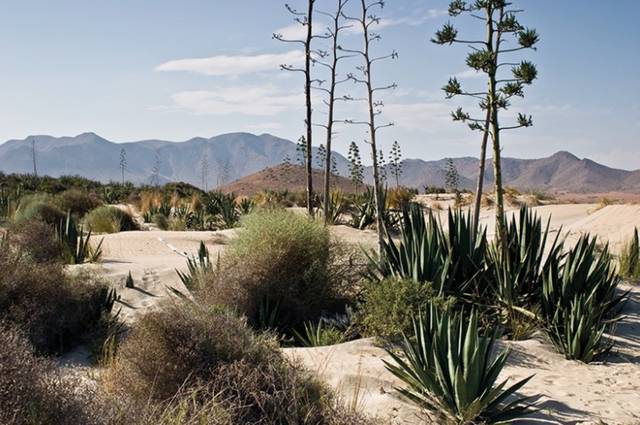Published: June 3, 2021
Sara Wheeler has written a generous and perceptive review of Outlandish in the Spectator.
Hunt unfurls his sleeping bag under a pink moon, breakfasts on a raw white onion and meditates on what we have lost.
This pleasant volume, the author announces in the introduction, is ‘not a nature book, or even a travel book, so much as a book of fantasy: four small pilgrimages into imagination’. In its pages Nick Hunt unfurls his sleeping bag under a pink moon, breakfasts on a raw white onion and meditates both on what remains and on what we have lost.
Outlandish is divided into four parts, each covering a short walk through a uniquely unusual landscape: Arctic tundra in the Cairngorms; a remnant of primeval forest straddling Poland and Belarus (‘the closest thing that Europe has to a true jungle’); the continent’s ‘only true desert’, in Spain’s south-eastern Andalucía; and the grassland steppes of Hungary.
What unites the four? ‘Each seemed to belong to another part of the world,’ writes Hunt, ‘or even to another historical or geological era’. While describing these places minutely he uses them to take the reader further: ‘This is a book about places that transport.’ Elsewhere he calls his destinations ‘portals to elsewhere — exclaves not only of place but of deep time’.
Hunt unfurls his sleeping bag under a pink moon, breakfasts on raw onion and meditates on what we’ve lost
Hunt, whose two previous books also cover European walks, quotes judiciously from sources ranging from George Mon-biot and the Aberdonian poet Nan Shepherd to an actual shepherd, the 18th-century James Hogg. He is good on myth and folklore, fragments of which he embeds (concerning Am Fear Liath Mòr, for example, the Big Grey Man of Scotland’s Ben Macdui). Similarly, he takes an agreeable canter in each of the quartets through local and national history. In this way the prose switches nimbly from the wide-angle lens to the close-up.
In Poland, the age-old conflict between man and nature takes centre stage. Białowieza, the largest surviving stump of the original forest that once stretched across the continent, is now an ‘exclave of primeval woodland’ and a national park covering more than 1,000 square miles of oak, lime and hornbeam groves along with tracts of alder and spruce. While its ‘tangled heart has remained inviolate for at least 800 years’, loggers and other predators prowl. Satellite images reveal that in a single year recently Białowieza lost up to 180,000 trees, many centuries old.
The author displays a lively interest in words (‘Gleam, gloam, gloom, glow’) and particularly in toponyms. The word ‘outlandish’ which furnishes the book’s title derives from the Old English utland, which means ‘foreign country’, and the River Avon means River River, as afon is Welsh for river. I was thrilled to learn that ‘solast-agia’, a Latin and Greek combo, is a philosopher’s term for the existential anguish for an environment that has gone.
Hunt is a fine descriptive writer — mountains ‘breach like whales’ and ‘an uproar of birds’ breaks a brief forest silence after a spruce topples. The style is chatty, with dabs of humour. Of his late great-uncle John Hunt, who led the triumphant 1953 expedition up Everest, he recalls: ‘His tallness is what I remember most — he seemed halfway up a mountain already.’
But at climactic moments the prose can tend to the bathetic (‘The scale is hard to comprehend’) and Hunt’s ear for rhythm is unreliable. One sentence ends: ‘Whatever our dreams might be of.’ Certain images fail: ‘glassy lids’ grow on a stream overnight ‘like funguses’ — but fungi are spongy. More seriously, Hunt compensates for lack of action with a surfeit of words. When he writes: ‘We clothe ourselves for a hostile environment in which our bodies do not suffice’, I would have preferred: ‘It was cold.’
He does not indulge in the faux self-deprecation that afflicts many of his tribe. On the contrary, the touches of anti-heroism in these pages are endearing, as when he trips and his shiny new ice-axe brains him, or when he flunks a horse-riding test in Hungary. One can’t imagine Patrick Leigh Fermor either failing such a test or admitting it. (The fabled PLF walked the same plain in the 1930s and recorded it in Between the Woods and the Water, an enterprise Hunt repeated in homage in his2014 volume Walking the Woods and the Water.)
At Hortobágy, also on the barren puszta or Great Hungarian Plain where freshwater marshes have been drying out for ten millennia, Hunt sees the ugly face of far-right nationalism at the Osök Napja festival of steppe-dwelling people. He is an astute observer of the baleful consequences of economic displacement, as he was in his book Where the Wild Winds Are.
He sounds a warning note in the introduction: ‘The greater outlands of the world are vanishing or being changed beyond all recognition.’ But this is not a book of overt environmental propaganda. Hunt wisely leaves data to the experts, while pointing at the catastrophe of climate change. ‘The birds are all leaving,’ says an interlocutor one night as a bottle stands empty and a candle gutters, ‘and no one cares.’


